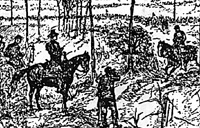I've looked at, but I've only seen about five sets.
At the most basic, this house rule states that no infantry unit (cavalry and artillery are exempt) may be given a first fire or charge order unless an officer in line of command is within one foot of the unit. If the unit is given an "illegal" order, the order is shanged to conditional hold. With this rule, officers that are removed due to death or injury must be replaced, or entire brigades become very ineffective. Similarly, higher level officers must also be replaced.
When an officer is lost, he is not replaced until the officer casualty phase of the next turn. If a brigade commander is lost, each of the remaining regiments under his command are assigned a number (typically from one to six.) A die is rolled, with the chosen regiment generating the new officer, who must be rolled for during that phase. Higher ranking officers are replaced in a similar way, with original brigade or division officers being randomly selected to replace the downed commanders, with a one turn delay to replace the promoted guy. In campaign games, the chain of command is determined in advance; but in all cases, there is a one turn delay to fill a vacancy.
In campaign games we allow officers who receive light wounds to return to the action with their benefits intact. They are unable to give any orders, however, until the number of turns rolled for the light wound have passed. For example, if a two is rolled, the officer may not give orders for the next two turns. Of course, while waiting, the gentleman must still roll to see if further injury is inflicted.
Some other refinements we've tried (but which we don't use in any consistent fashion) include: increasing the effective range of replacement officers to six inches; rolling for benefits for the replacement officers (-1, 0, +1); allowing officers not in line of command to give charge orders when they are touching the unit so ordered (the officer must remain with the unit throughout the charge); and last of all, requiring officers to be within two feet of their superior, lest the subordinate is unable issue charge orders.
We find that these house rules add an interesting element to the game. Brigades (and to some extent divisions) must operate in close proximity, or the isolated regiments will lose some of their effectiveness. Officers become very important, especially in an attack. Indeed, more than one well-planned assault has faltered and finally failed due to the untimely demise of a commander. These are not perfect rules, but it's how we do it at my house.
Related
This article appears in MagWeb (Magazine Web) on the Internet World Wide Web. Officers in Johnny Reb seem to do little officering. They simply improve the morale or firing of units they are close to, or under the optional rules, officers limit the number of orders that may be given to units in their command. Based on an idea found in a Seven Years War rule set, we've developed a house rule that gives these commanders a bit more responsibility. I haven't found a rule like this in the Civil War rules
Officers in Johnny Reb seem to do little officering. They simply improve the morale or firing of units they are close to, or under the optional rules, officers limit the number of orders that may be given to units in their command. Based on an idea found in a Seven Years War rule set, we've developed a house rule that gives these commanders a bit more responsibility. I haven't found a rule like this in the Civil War rules
Back to The Zouave Vol VIII No. 1 Table of Contents
Back to The Zouave List of Issues
Back to Master Magazine List
© Copyright 1994 The American Civil War Society
Other military history articles and gaming articles are available at http://www.magweb.com